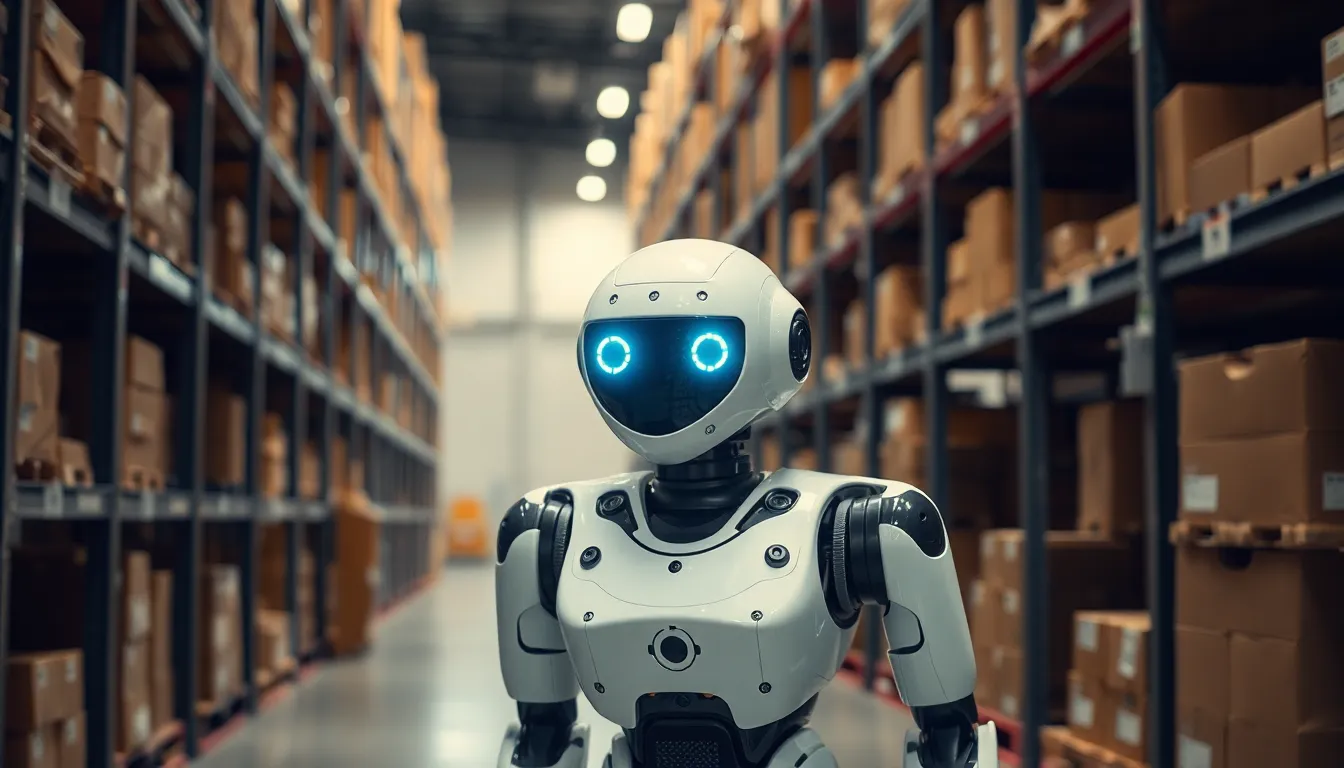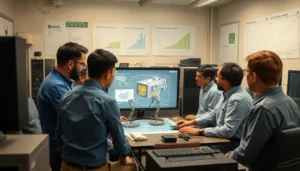Table of Contents
ToggleImagine a world where robots handle your chores, serve you coffee, and even walk your dog—without asking for a raise! Future tech robotics is rapidly transforming this dream into reality. These fascinating machines aren’t just for sci-fi movies anymore; they’re becoming part of everyday life, making tasks easier and more efficient.
From self-driving cars that promise to reduce traffic jams to robotic assistants that can help with everything from cooking to cleaning, the future looks bright—and a little quirky. As technology advances, the possibilities seem endless. So buckle up and get ready to explore how robotics is revolutionizing our lives, one gadget at a time.
Overview of Future Tech Robotics
Future tech robotics encompasses a broad range of advancements that enhance daily living. Innovations in robotics technology enable machines to perform intricate tasks, driving efficiency in various sectors. Robots are increasingly capable of executing household chores, serving drinks, and even exercising pets.
Service robots operate in public places, transforming customer experiences in restaurants and hotels. Self-driving vehicles represent significant progress, showcasing the integration of AI and robotics. Automated systems provide precise navigation and decision-making capabilities, making transportation safer and more efficient.
Kitchen robots streamline cooking processes by preparing ingredients, cooking meals, and even cleaning up afterward. Data shows that these appliances reduce time spent on tasks, allowing individuals to focus on other activities. Robotic vacuum cleaners automatically navigate spaces, optimizing home maintenance.
Industrial robots contribute to increased productivity, especially in manufacturing settings. They assemble complex components at faster rates, minimizing human error. Collaborative robots, or cobots, work alongside humans, enhancing workplace safety and efficiency.
Healthcare robotics revolutionizes patient care through surgeries, rehabilitation, and monitoring. Advanced robotic systems assist in minimally invasive procedures, improving recovery times and outcomes. Telepresence robots allow doctors to consult patients remotely, broadening access to healthcare services.
The continuous evolution in robotics indicates a future where daily routines remain increasingly intertwined with automated solutions. As advancements progress, their impact on productivity and quality of life will become more pronounced. Future tech robotics promises to unlock new avenues for innovation, reshaping expectations and experiences across various fields.
Key Innovations in Robotics

Innovations in robotics pave the way for enhanced functionality and interaction. The incorporation of advanced technologies fuels transformation across various sectors.
Artificial Intelligence Integration
AI integration significantly elevates robotic capabilities. Machines equipped with AI algorithms can analyze large data sets to make informed decisions. They learn from interactions, improving efficiency over time. For instance, robots in healthcare use AI for diagnostics, assisting medical professionals with precise data analysis. Service robots in retail leverage AI to personalize customer experiences, addressing consumer preferences accurately. Enhanced perception through machine learning allows robots to understand environments and respond accordingly. With this technology, the collaboration between humans and robots becomes seamless, fostering productivity.
Autonomous Navigation Systems
Autonomous navigation systems revolutionize how robots traverse complex environments. These systems utilize sensors and mapping technologies to navigate safely. Robots in warehouses rely on sophisticated navigation to move items efficiently, optimizing logistics operations. Drones equipped with these systems can deliver packages directly to doorsteps without human touchpoints, streamlining delivery services. Robots designed for agriculture autonomously navigate fields, enhancing precision in planting and harvesting. This capability ensures that robots can operate in dynamic settings while avoiding obstacles. Innovations in navigation make robotic solutions both reliable and efficient, enhancing their usability across various industries.
Applications of Future Tech Robotics
Future tech robotics encompasses a variety of applications revolutionizing daily life and work environments.
Healthcare Robotics
Healthcare robotics enhances patient care through precision and efficiency. Robots assist in surgery, providing steady hands that improve outcomes. Telepresence enables doctors to consult patients remotely, bridging geographic gaps in access to care. With robotic exoskeletons, rehabilitation processes accelerate, allowing patients to recover faster. Robotics in pharmacies automates medication dispensing, minimizing human error. These advancements collectively ensure higher standards in healthcare delivery.
Industrial Automation
Industrial automation relies heavily on robotics to boost productivity. Robots perform repetitive tasks, from assembly to quality control, with remarkable speed and accuracy. Collaborative robots work alongside human operators, ensuring safety while increasing output. Automation systems monitor workflows, optimizing resource allocation within factories. Data analysis through AI enhances decision-making in manufacturing processes. This synergy of robotics and industry transforms traditional operations.
Domestic Robotics
Domestic robotics simplifies household chores, making home life more manageable. Robotic vacuum cleaners deftly navigate spaces, saving time on cleaning. Smart appliances, like robotic lawn mowers, automate tasks outside the home, maintaining gardens effortlessly. Kitchen robots assist with meal prep and cooking, providing convenience for busy families. Voice-activated assistants offer hands-free help, controlling smart homes seamlessly. Together, these innovations foster a more efficient and enjoyable living environment.
Challenges Facing Future Tech Robotics
Future tech robotics faces significant challenges that could impact their development and integration into society. Key issues include ethical considerations and technical limitations.
Ethical Considerations
Ethical dilemmas arise as robotics advances. Privacy concerns emerge with data collection by service robots in public spaces. Autonomy raises questions about accountability when robots make decisions. Employment displacement occurs as automation reduces the need for human labor in various sectors. Ensuring fairness and bias-free algorithms remains vital to avoid reinforcing societal inequalities. Regulations regarding the use of robots, especially in sensitive environments like healthcare, prompt ongoing debates about ethical practices. Addressing these concerns is essential to foster public trust and acceptance of robotic technologies.
Technical Limitations
Technical challenges hinder robotics from achieving their full potential. Current sensors limit robots in complex environments, making navigation difficult. Battery efficiency remains an issue, as many robots struggle with prolonged usage without recharging. Software reliability affects performance, with bugs potentially leading to operational failures. Integration of artificial intelligence into machinery often presents compatibility issues across systems. Limited processing power can restrict real-time data analysis, impacting decision-making capabilities. Overcoming these limitations is crucial for enhancing robotic functionality and reliability while ensuring safety across various applications.
The advancements in future tech robotics are reshaping how individuals interact with their environment. As robots become integral to daily tasks and industries, they promise to enhance efficiency and convenience. Innovations in AI and autonomous systems are pushing boundaries, allowing robots to perform complex tasks with precision.
However, navigating the ethical and technical challenges is crucial for their successful integration. Addressing privacy concerns and ensuring accountability will foster public trust. As society embraces these changes, the potential for robotics to improve quality of life becomes increasingly apparent. The journey ahead is filled with opportunities that could redefine everyday experiences and expectations in remarkable ways.






